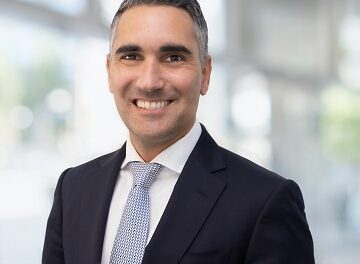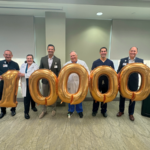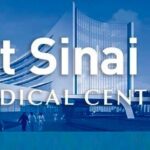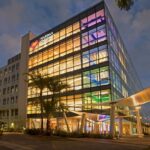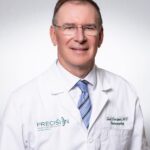 Listening to Chris Claflin, President and CEO of University Nuclear and Diagnostics, describe their business you are struck by the firms achievement in making a highly complex process so simple for the physicians who wish to offer one of the most effective diagnostic tests at detecting heart disease right in their own offices.
Listening to Chris Claflin, President and CEO of University Nuclear and Diagnostics, describe their business you are struck by the firms achievement in making a highly complex process so simple for the physicians who wish to offer one of the most effective diagnostic tests at detecting heart disease right in their own offices.
University Nuclear and Diagnostics offers cardiologists and internists a complete package of equipment, personnel, consulting and support services which allows physicians to conduct nuclear stress tests in their offices. Available for over 20 years, by injecting radioisotopes into the blood stream, this test allows physicians to see which parts of the heart muscle are receiving an adequate supply of blood and which might not be. Its a significant improvement over its sonic cousin the echocardiogram which only looks at the structure and velocity of blood flows not necessarily the areas which are receiving an inadequate supply.
Currently, in large part due to the cost and complexity of a nuclear stress test, many of these patients are referred by their physicians to other medical facilities such as hospitals or independent testing facilities. By using the complete package of services offered by University Nuclear and Diagnostics the test can be brought in house and both the patient and treating physician benefit. The patient is able to have the nuclear stress test done right in the office of their treating physician which is much more convenient and eliminates an additional trip to another facility. The physician is able to maintain control of the patient and, by billing for the test him or herself, retain the revenues that would have otherwise been referred out along with the patient. In todays environment of declining reimbursements and increasing costs, the model of bringing diagnostics in house to retain revenues associated with patients is one of the few remaining realistic ways physicians have to increase practice profitability.
Due to a recent regulatory change bringing nuclear medicine under the Stark Laws, after January 1st, 2007, physicians that currently have financial relationships with diagnostic facilities or lease space from other physicians may find that they can no longer legally bill Medicare for this test. According to Claflin, “While every situation is different and physicians should consult their attorneys, the bottom line is that it is going to be hard to participate in the economics of the test in any meaningful way unless a physician is conducting the tests in the same building where his or her practice is located. We have spent a great deal of time with our attorney ensuring our services are Stark compliant and will allow our clients to continue billing legally after January 1st.”
The business philosophy statement of University Nuclear and Diagnostics says, “UND provides affordable, on-premises, complete nuclear solutions to primary care physicians and cardiologists with service that exceeds expectations.” These few words cover a lot of ground.
The process of conducting a nuclear stress test involves considerable complexity and coordination of people, equipment and materials. However, taking advantage of its technical expertise, highly qualified staff, and economies of scale University Nuclear and Diagnostics has simplified and packaged the process for use by physician practices. A physician client of UND only needs to do two things, schedule their patients for the nuclear stress test and bill for the test, UND does the rest. The rest is quite an extensive list of services and includes acquisition and maintenance of the equipment ($225,000 gamma camera) with no capital outlay by the practice, installation in the physicians office, obtaining state certification for operation, providing qualified nuclear technicians to perform the test who are state certified and ACLS certified, and supplying the nuclear isotope contrast media for the test. UND can even facilitate the interpretation of the test through highly trained, board certified cardiologists who are certified to read them.
Claflin explains the operational benefit to the physician when working with University Nuclear and Diagnostics as follows, “Certainly a physician could attempt to do this on their own. However, just the process of gaining state certification for someone who is not familiar with the process can be overwhelming and time consuming. In addition, they would have to find and supervise the qualified staff needed to do the tests, worry about maintaining the equipment, keep up with regulatory requirements regarding radiation monitoring, and take the risk of financing the equipment. The alternative offered by UND provides all of these services by experts in the field at a cost which is much less than if done by the practice itself and without all the headaches. Because of our economies of scale on equipment, personnel and materials, physicians can lease the complete package from UND and begin testing with no money out of pocket. There is a considerable margin between what the physician will pay UND for conducting the test and their reimbursement for the test which provides a substantial revenue stream for their practice.”
Claflin covers the financial justification for a practice as follows, “For an average internal medicine practice seeing fifteen to twenty patients per day, the number of these patients already coming to the practice who may need nuclear stress testing could easily generate enough business for the practice to double or triple its annual income. And when you consider that our program has a break even rate of less than 6 tests per month, the financial justification for doing this is very strong even for small groups and solo practitioners. Based on the actual payer mix in a physicians practice, we provide an analysis on expected profitability to the physician prior to any decision to use UNDs services.”
As a former Top Gun fighter pilot for the US Navy, graduate of Carnegie Mellon University and Harvard Business School, Claflin brings a unique combination of leadership skills, talent and integrity to University Nuclear and Diagnostics. “We have a great deal of medical and legal knowledge on our board for guidance. I was brought in not just to grow the company but to do so correctly. When we make promises, we keep them. Our company values are integrity, reliability, service and respect and each and every employee including myself is held to these. We have had a great deal of interest in our services particularly from the internal medicine and general practitioner communities who have not had access to this type of testing until recently. One of the hardest things I have had to do has been to limit our growth rate to ensure we maintain the proper level of service to our clients. But, if you are going to have any, I guess those are good problems to have.”
Post Views: 781
 Listening to Chris Claflin, President and CEO of University Nuclear and Diagnostics, describe their business you are struck by the firms achievement in making a highly complex process so simple for the physicians who wish to offer one of the most effective diagnostic tests at detecting heart disease right in their own offices.
Listening to Chris Claflin, President and CEO of University Nuclear and Diagnostics, describe their business you are struck by the firms achievement in making a highly complex process so simple for the physicians who wish to offer one of the most effective diagnostic tests at detecting heart disease right in their own offices. 



